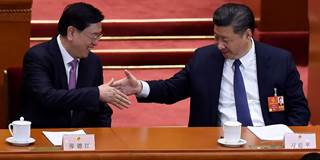In a fast-changing world, governance systems must support rapid decision-making under conditions of radical uncertainty, while maintaining accountability. That – not the Western expectation of what a governance system should look like – is the standard by which we should be assessing political developments in China.
HONG KONG – Following China’s “two sessions” – the annual meetings of the national legislature and the top political advisory body – all Western observers, it seems, are discussing the removal of the two-term limit for the president. Xi Jinping, the international media insists, is consolidating power, and may even be laying the groundwork for a Mao Zedong-style personality cult. But this reading is fundamentally flawed.
The predominant Western view that Xi’s growing authority represents a dangerous trend partly reflects anxiety over growing challenges to democracy in the United States and across Europe. But it makes little sense to view Chinese political developments through a Western lens, especially at a time when the world is shifting from a unipolar to a multipolar system.
Recent changes in China should instead be regarded as part of a broader process, in which competing systems of governance are emerging to cope with complex, globally connected challenges, such as disruptive technologies, geopolitical rivalries, climate change, and demographic shifts. In short, countries are trying to find their governance footing.

HONG KONG – Following China’s “two sessions” – the annual meetings of the national legislature and the top political advisory body – all Western observers, it seems, are discussing the removal of the two-term limit for the president. Xi Jinping, the international media insists, is consolidating power, and may even be laying the groundwork for a Mao Zedong-style personality cult. But this reading is fundamentally flawed.
The predominant Western view that Xi’s growing authority represents a dangerous trend partly reflects anxiety over growing challenges to democracy in the United States and across Europe. But it makes little sense to view Chinese political developments through a Western lens, especially at a time when the world is shifting from a unipolar to a multipolar system.
Recent changes in China should instead be regarded as part of a broader process, in which competing systems of governance are emerging to cope with complex, globally connected challenges, such as disruptive technologies, geopolitical rivalries, climate change, and demographic shifts. In short, countries are trying to find their governance footing.